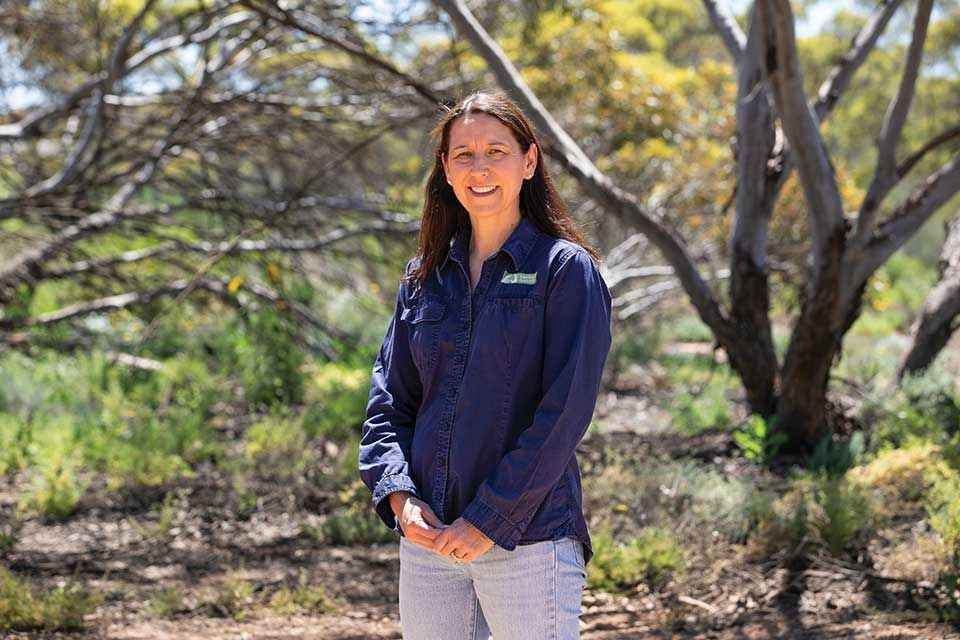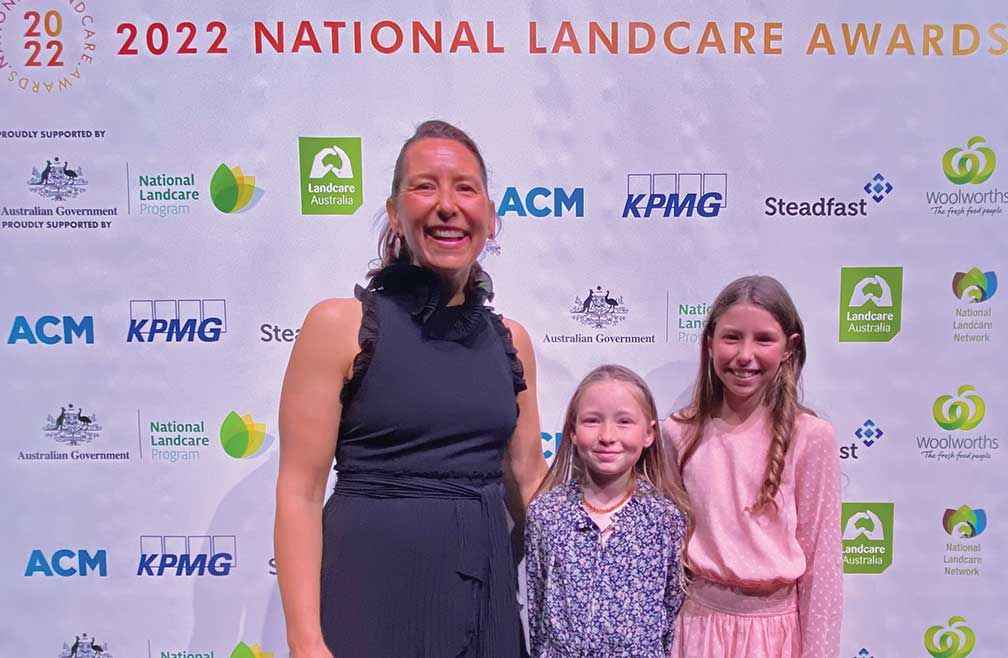Victorian Landcare Magazine - Summer 2023-24, Issue 86

I was born and bred in a Mallee community and like many young people moved away to study and work. I completed tertiary science and environmental qualifications and worked for a while, but in 2016 we returned to the Mallee to manage our broadacre family farming enterprise and raise our three daughters.
I have two part-time Landcare roles. I’m employed by Nullawil Landcare Group with funding from the Victorian Landcare Facilitator Program to work 20 hours a week as the South East Mallee Landcare Facilitator. In this role I support eight Landcare groups in the townships of Berriwillock, Lalbert, Ultima, Birchip, Nullawil, Culgoa, Sea Lake, and Curyo-Watchupga.
I am also employed one day a week directly by the Mallee Landcare Group as their Landcare Facilitator covering the townships of Ouyen, Mittyack, Patchewollock, Speed, Nandaly, Tempy, Walpeup and Underbool.
I have a grassroots passion for agriculture and the environment. In my Landcare roles I undertake environmental work while collaborating and networking at local, state, and national levels to empower improved environmental and agricultural outcomes. Emerging technologies, the sporadic nature of dryland farming and possessing strong organisational skills enables me to support others in achieving positive change for our environment and climate.

Above: Marissa Shean, Alexa Shean and Memphis Shean representing Tempy Primary School at the National Landcare Awards in Sydney 2022.
In 2000, when I started out in Landcare, the professional and geographic isolation of working in the Mallee was much more challenging. Training opportunities were often based in the city or interstate and even local Landcare facilitators did not catch up that often.
New technologies have really empowered Landcare facilitators. Online platforms for video and audio conferencing now allow me to collaborate, chat and participate in webinars and training that I would have previously had to travel away from the farm and family to access. Even the smart phone is reducing the tyranny of distance and has become a key tool in connecting with my Landcare community.
Communication and collaboration skills are vital in my roles. I now have a wonderful network of people from my Landcare groups, the wider community, and stakeholders across the state that are sharing common interests and exploring innovation to improve agricultural and environmental outcomes. I look forward to even more improvements in communication technology infrastructure in rural Victoria in the future.
I love the flexibility of being a Landcare facilitator. I get to spend time in the field with community groups, visit new places and step out new projects. Working casually means I can juggle Landcare, attending my children’s special school events and farm work. Sometimes this requires catching up on my Landcare work in the evening when my children are in bed.
November to February is generally a quieter period as many of my Landcare members are involved with harvest and then taking leave with their families. This allows me to catch up on report writing, acquittals, planning activities for the next year and enjoying leave with my family.
Strong organisation skills are critical when assisting groups with grant submissions. Many long days and late nights are spent researching, obtaining quotes and letters of support, developing project plans, assisting with mapping, budgets, and acquittals. There can be a lot of pressure when you are working with deadlines for funding rounds that are back-to-back. Preparing major reports and publishing newsletters can also be very time consuming.
Time management is critical. I have lists of jobs to do, lists of project ideas awaiting the right funding opportunities, and calendar
reminders of when grants open and close, and when milestones and reports are due. I also need to schedule project monitoring, make time to take photographs of our projects, undertake fieldwork, organise and promote workshops, programs and events on social media. Travel time must also be factored into my planning with my groups spread over a 100-kilometre radius.
Online platforms for video and audio conferencing now allow me to collaborate, chat and participate in webinars and training that I would have previously had to travel away from the farm and family to access.
One positive to come out of COVID-19 has been the leadership, mentoring and upskilling opportunities that have reduced social isolation and fostered stronger and more resilient remote, rural, and regional communities. I have attended grant writing, social media, mentoring and leadership programs and workshops – many of them conducted wholly online.
I have been able to use online platforms to take part in strategic planning, management meetings, and contribute to policy development from the comfort and safety of my home office. In 2021, I participated in the online celebration of the 2021 Victorian Landcare Awards where I was highly commended in the Victorian Farmers Federation/Landcare Victoria Inc. Heather Mitchell Memorial Fellowship Award.
I love the flexibility of being a Landcare facilitator. I get to spend time in the field with community groups, visit new places and step out new projects.
In 2022, I had the privilege of attending the National Landcare Awards in Sydney where Tempy Primary School was representing Victoria in the Woolworths Junior Landcare Team Award. Working with young people is so gratifying. Their enthusiasm for the environment and yearning to make a difference is inspiring.
Looking to the future, with all the complications climate change will bring, I think Landcare facilitators will be more important than ever. I look forward to the challenges this will bring.
Marissa Shean is South East Mallee Landcare Facilitator. Her position in this role is funded through the Victorian Landcare Facilitator Program. For more information southeastmalleelandcare@gmail.com

Above: